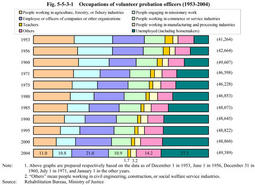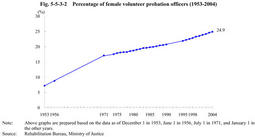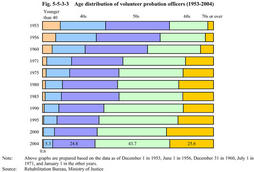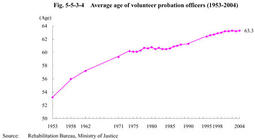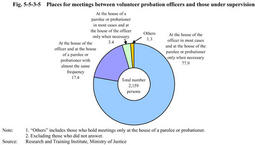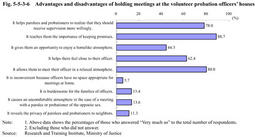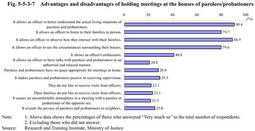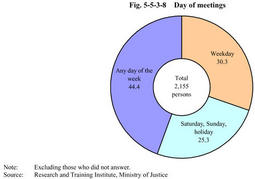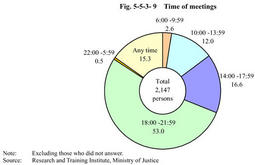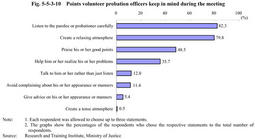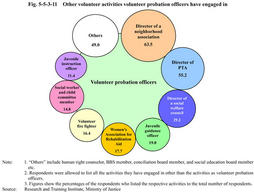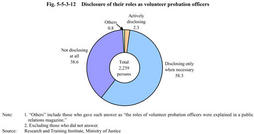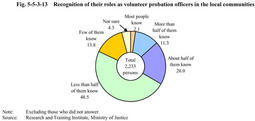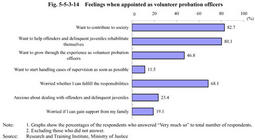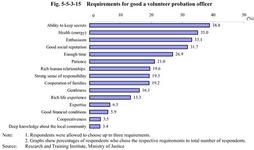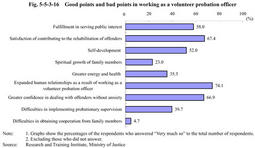| Previous Next Index Image Index Year Selection | |
|
|
1. Volunteerprobationofficers A volunteer probation officer is a volunteer worker commissioned by the Minister of Justice and has the mission of supporting the improvement and rehabilitation of offenders and juvenile delinquents.Article1of the Volunteer Probation Officer Law specifies that a volunteer probation officer aims to support the improvement and rehabilitation of offenders and also to educate the public on crime prevention in a spirit of social community service and also that their mission is to make the local communities better places and contribute to the welfare of individuals and the public.This provision clearly defines them as volunteers carrying out their mission in a spirit of social service.
Article3(1)of the Volunteer Probation Officer Law specifies the qualifications required to become a volunteer probation officer,as he/she(1)must have the characters and behavior socially respected,(2)must have passion and enough time to carry out the mission,(3)must be leading financially stable lives,and(4)must be healthy and energetic. Volunteer probation officers have many responsibilities,the most important of which is to exercise probation/parole supervision for offenders and juvenile delinquents.Since probation/parole supervision is administrated through the collaboration between professional probation officers and volunteer probation officers,they play an especially important role in operating the probation/parole supervision. The current system of volunteer probation officers has been in place since the enforcement of the Volunteer Probation Officer Law in1950.As about50years have passed since then,their features have changed in many respects. The following section first briefly overviews the changes in volunteer probation officers based on official statistics and then describes their activities and attitudes based on the survey conducted by the Research and Training Institute of the Ministry of Justice. Although the special article of this white paper focuses on the treatment for adult offenders,about60%of the parolees and probationers newly placed under supervision are juveniles(data in2003,excluding juveniles under short-term probation for traffic offenses.For details,see Appendix2-13 ),and volunteer probation officers therefore supervise more juveniles than adults.This situation needs to be taken into consideration when problems faced by volunteer probation officers are addressed. (1) Changes in volunteer probation officers A volunteer probation officer is a part-time government employee without pay.He/she is only reimbursed for all or part of the actual expenses in carrying out the responsibilities. Fig. 5-5-3-1 shows a breakdown of volunteer probation officers by occupation.The proportion of those engaging in agriculture/forestry/fishery and missionary work has gradually decreased,while the proportion of those unemployed has increased,reflecting an increase of female homemakers and those retired. Fig. 5-5-3-2 shows the percentage of female volunteers.It rose steadily from7.2%in1953to24.9%in2004.The increase of females,who now represent one out of four,is desirable in diversifying volunteer probation officers.
Fig. 5-5-3-1 Occupations of volunteer probation officers(1953-2004) Fig. 5-5-3-2 Percentage of female volunteer probation officers(1953-2004) Fig. 5-5-3-3 shows the age distribution of volunteer probation officers,and Fig. 5-5-3-4 shows their average age.It is natural for volunteer probation officers to be rather old because they need to have a good reputation and enough time.They are,however,aging further at a rapid pace.While those aged50or under accounted for more than70%with the average age of53.2in1953,the percentage of those aged 60 or over accounted for almost70%with the average age of63.3in2004.Ageing volunteer probation officers are afraid to have difficulty in understanding juveniles and young offenders,although their rich experiences contribute to the supervision of offenders.It is therefore necessary to appoint younger officers,energetic and flexible in treating offenders.For this purpose,a retirement system was introduced in April1999,which prohibits the reappointment of a volunteer probation officer aged76or over.The system has been in place as a transitional measure for the first five years since the introduction and been fully implemented from April2004.We have to wait to see whether the retirement system causes any change in the age composition of volunteer probation officers.In 2004,more officers will retire than usual as a result of the full implementation of the retirement system.To fill the vacancies,new officers need to be appointed. Fig. 5-5-3-3 Age distribution of volunteer probation officers(1953-2004) Fig. 5-5-3-4 Average age of volunteer probation officers(1953-2004) (2) Special survey:Activities of volunteer probation officers and their attitudes The Research and Training Institute of the Ministry of Justice conducted a special survey on volunteer probation officers to reveal their activities and attitudes by(1)holding interviews with82volunteer probation officers selected nationwide,(2)preparing a questionnaire based on the interviews,and(3)sending the questionnaire to a total of3,000volunteer probation officers randomly selected nationwide.It was conducted from February through May in2004with2,260officers returning the questionnaire(response rate of75.3%).
A. Breakdown of respondents by gender,age,and job Of the respondents,1,679(74.3%)are male,while581(25.7%)are female.The average age is64.4and those in their60s accounts for45.5%,70s for28.4%,and50s for22.5%.
The largest proportion(22.1%)of their occupations are unemployed other than homemakers followed by homemakers(17.3%),employees or officials of companies or other organizations(14.4%),agriculture/forestry/fishery(10.8%),commerce or service(10.0%),and missionary work(9.1%). B. Contacts with parolees/probationers A volunteer probation officer exercises the supervision for a parolee/probationer by keeping contact with him/her at appropriate intervals to check how he/she leads his/her life and to give necessary advice and support.The contacts may be made in the meeting either at the volunteer officer's house or the parolee/probationer's house.In addition,an officer may use other means of contact such as the telephone and mail.In reality,about three out of four volunteer officers hold meetings mostly at their own houses,as shown in Fig. 5-5-3-5 .
Fig. 5-5-3-5 Places for meetings between volunteer probation officers and those under supervision Fig. 5-5-3-6 shows the answers to a question about the advantages and disadvantages of holding meetings at their houses.Most officers gave positive remarks such as"It teaches parolees/probationers the importance of keeping promises,""It allows them to meet their officers in a relaxed atmosphere,""It helps them realize that they should receive supervision more willingly,"and"It helps them feel close to their officer."On the other hand,negative comments include"It is burdensome for the officers'family,"and"It is uncomfortable in meeting with a parolee/probationer of the opposite sex."Negative comments show the problems faced by volunteer probation officers who use their houses for meetings.Fig. 5-5-3-6 Advantages and disadvantages of holding meetings at the volunteer probation officers'houses Fig. 5-5-3-7 shows the answers to a question about the advantages and disadvantages of holding meetings at the parolees/probationers'houses.Most officers gave positive remarks such as"It allows officers to better understand the actual living situations of parolees/probationers,""It allows officers to observe their family relationship,""It allows officers to hear their families,"and"It allows officers to see the circumstances surrounding their houses."In meetings at parolees/probationers houses,they can better understand the reality of their lives.On the other hand,only20%of officers consider that such meetings allow them to talk in an unhurried and relaxed manner.Furthermore,one in four commented that such meetings make parolees/probationers passive in receiving supervision and that they have no space appropriate for meetings in their home.Negative comments reflect officers'difficulties in cond ucting meetings at parolees/probationers houses.Fig. 5-5-3-7 Advantages and disadvantages of holding meetings at the houses of parolees/probationers C. Dates of meetings Fig. 5-5-3-8 shows the days when a volunteer probation officer meets a parolee/probationer.About one out of four held meetings on Saturdays,Sundays,and holidays. Fig. 5-5-3-9 shows the time zones for their meetings.About half of meetings were from6:00p.m.to9:59p.m.This indicates that meetings are held at such times that allow parolees/probationers to attend after school or work.
Fig. 5-5-3-8 Day of meetings Fig. 5-5-3-9 Time of meetings D. Points that volunteer probation officers keep in mind during meetings Fig. 5-5-3-10 shows the answers to a question as to what points they keep in mind during the meeting with a parolee/probationer.The82.3%officers answered that"they try to listen to the parolee/probationer carefully,"while79.8%said that they try to create a relaxing atmosphere.The answers indicate that volunteer probation officers are trying to build good relationships with parolees/probationers in supervising them.
Fig. 5-5-3-10 Points volunteer probation officers keep in mind during the meeting E. Other volunteer activities etc.in communities A volunteer probation officer is often said to take part in their local communities,and what is the reality?
Most volunteer probation officers surveyed have lived in their communities for a long time.The average length is about46years.To the question of whether they have engaged in any volunteer activities other than volunteer probation officers,93.9%of them answered yes.The type of activities is shown in Fig. 5-5-3-11 .The most common role they have played was head of a neighborhood association(63.5%),followed by head of a Parents and Teachers Association(55.2%),head of a social welfare council(29.2%),juvenile guidance officer(19.0%),member of a Women's Association for Rehabilitation Aid(17.7%),volunteer fire fighter(16.4%),social worker or child committee member(14.8%),and juvenile instruction officer(11.4%).,Those who have engaged in two types of volunteer activities in other volunteer probation officers accounted for23.1%,three for22.8%,and four for29.9%.In local communities,many volunteer probation officers play various roles. Fig. 5-5-3-11 Other volunteer activities volunteer probation officers have engaged in F. Communities recognition of volunteer probation officers Volunteer probation officers are required to protect the privacy of their supervising parolees/probationers and also have diverse connections with local communities. Fig. 5-5-3-12 shows that about40%officers have not disclosed their roles as volunteer probation officers to the public,while about60%have revealed their roles only if necessary.
Fig. 5-5-3-13 shows the answers from the respondents who were asked"whether the local people know the activities and roles of volunteer probation officers."About60%respondents answered"less than half of people know"or"few people know."The answers indicate that volunteer probation officers have not been received sufficient recognition from society,largely because they have to protect the privacy of parolees/probationers in carrying out their responsibilities.Against this backdrop,77.1%officers answered"Volunteer probation officers need to receive more recognition from the society."Moreover,45.0%answered"More public information activities are needed on the roles of volunteer probation officers"because it may increase those people who wish to become volunteer probation officers. Fig. 5-5-3-12 Disclosure of their roles as volunteer probation officers Fig. 5-5-3-13 Recognition of their roles as volunteer probation officers in the local communities G. Reasons for becoming volunteer probation officers Asked about the reason for becoming a volunteer probation officer,70.8%respondents answered that they were recommended by predecessor volunteer probation officers and16.6%answered that they were recommended by the municipal or ward office.Only0.9%answered that they volunteered them.
Fig. 5-5-3-14 shows the answers to how they felt when appointed as volunteer probation officers.The answers were"I was worried if I could fulfill the responsibilities"(68.1%),"I would like to contribute to society"(82.7%),and"I wanted to help offenders and delinquent juveniles rehabilitate themselves"(80.1%).Furthermore,46.8%answered"I wished to grow through the experience as a volunteer probation officer."Volunteer probation officers hope to contribute to society and other people's lives and,at the same time,wish to grow through the activities as volunteer probation officers. Fig. 5-5-3-14 Feelings when appointed as volunteer probation officers H. Requirements for a good volunteer probation officer Fig. 5-5-3-15 shows the answers to what is required for a good volunteer probation officer.The answers were the ability to keep secrets(38.8%),health(energy)(35.0%),enthusiasm(33.1%),good social reputation(31.7%),enough time(26.9%),and patience(21.0%).
Fig. 5-5-3-15 Requirements for good a volunteer probation officer Fig. 5-5-3-16 shows the answers to list the good and bad points in working as a volunteer probation officer.As much as74.1%respondents pointed out the expanded human relationships through the activities as a volunteer probation officer,while more than half mentioned that they are satisfied in contributing to offenders'rehabilitation,have greater confidence in dealing with offenders without anxiety,feel fulfillment in serving public interest,and have matured self-development.On the other hand,as much as39.7%have experienced difficulties in rehabilitating offenders.Fig. 5-5-3-16 Good points and bad points in working as a volunteer probation officer (3) Conclusion While volunteer probation officers have been diversified as reflected in the increase of female officers,the incumbent officers are aging and it is urgently needed to recruit young officers..
The special survey on volunteer probation officers revealed that(1)they use their own houses for meetings with parolees/probationers,(2)they are trying to understand and accept parolees/probationers and making efforts to keep in contact with them,(3)they are engaging in many other volunteer activities that contribute to their local communities,(4)they place importance on keeping offenders'secrets while hoping that local people better understand their roles,and(5)their desire to contribute to society and to help offenders rehabilitate themselves is their spiritual foundation as well as source of their fulfillment. In the interviews conducted as a part of the special survey,some officers made such comments as"Once I took charge of a parolee who had connections with an organized crime group.But he started leading a stable life after his marriage and visited me with his child long after his supervision period was over,""One of the juveniles I supervised had let me know the importance of opening up one's mind.She has come to see me every year even after her supervision period ended,""The parents of a parolee thanked me with tears in their eyes at the end of their son's supervision,""I was pleased to hear a probationer say that he came to consult with me because he remembered me when he had a problem,"and"A probationer I took charge of rehabilitated himself and invited me to his wedding ceremony."The survey revealed that volunteer probation officers as grass-roots volunteers are helping offenders,producing tangible results by sincerely reach ing out to them and establishing trust with them. Volunteer probation officers engage in unnoticed but very important activities,indispensable for the effective treatment of offenders.Without their contribution behind the scenes,the country would suffer a deterioration in internal security.They,however,do not receive due social recognition.It is therefore necessary to promote public information activities about volunteer probation officers to motivate more people with various backgrounds to become volunteer probation officers,so that the system,a pride of Japan,can be maintained and further developed. |
